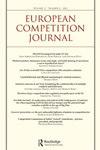将《数字市场法》纳入现有法律框架:“无偏见”条款的神话
Q2 Social Sciences
引用次数: 1
摘要
数字市场法案(DMA)是一项欧盟法规,为保护数字市场的公平性和可竞争性,确立了看门人平台的义务,该法案将很快开始适用。除了DMA之外,还有其他(欧盟和国家)规范平台行为的文书。尽管DMA明确规定它将在不损害其他文书的情况下适用,但人们怀疑它是否仅仅是对它们的补充。在某些情况下,DMA可能有资格成为特别法,从而优于其他法规。在其他情况下,基于至上原则,DMA可以凌驾于追求公平和可争议性以外的合法利益的国家文书之上。在某些情况下,DMA可能会使某些工具失去目的,而这并非立法者的意图。在上述所有情况下,DMA不会补充(但可能危及)现有制度的有效性。鉴于平台立法提案的雪崩,解决DMA和其他规则之间的潜在冲突对于保护法律确定性和确保管理有害平台行为的监管制度充分发挥其潜力至关重要。本文章由计算机程序翻译,如有差异,请以英文原文为准。
Fitting the Digital Markets Act in the existing legal framework: the myth of the “without prejudice” clause
ABSTRACT The Digital Markets Act (DMA), an EU Regulation establishing obligations for gatekeeper platforms in order to protect fairness and contestability in digital markets, will soon start to apply. In addition to the DMA, other (EU and national) instruments regulate platform conduct. Though the DMA explicitly provides that it will apply without prejudice to those other instruments, it is doubted whether it will merely complement them. In certain cases, the DMA may qualify as lex specialis, thereby prevailing over other regulations. In other cases, based on the principle of supremacy, the DMA may override national instruments that pursue legitimate interests other than fairness and contestability. There may also be occasions where the DMA may render certain tools devoid of purpose when this was not the intention of the legislator. In all the above cases, the DMA would not complement (but could possibly endanger) the effectiveness of the existing regime. Given the avalanche of legislative proposals for platforms, addressing potential conflicts between the DMA and other rules is essential to protect legal certainty and to ensure that the regulatory regime that governs harmful platform conduct reaches its full potential.
求助全文
通过发布文献求助,成功后即可免费获取论文全文。
去求助
来源期刊

European Competition Journal
Social Sciences-Law
CiteScore
1.50
自引率
0.00%
发文量
12
期刊介绍:
The European Competition Journal publishes outstanding scholarly articles relating to European competition law and economics. Its mission is to help foster learning and debate about how European competition law and policy can continue to develop in an economically rational way. Articles published in the Journal are subject to rigorous peer review by leading experts from around Europe. Topics include: -Vertical and Conglomerate Mergers -Enlargement of the Union - the ramifications for Competition Policy -Unilateral and Coordinated Effects in Merger Control -Modernisation of European Competition law -Cartels and Leniency.
 求助内容:
求助内容: 应助结果提醒方式:
应助结果提醒方式:


